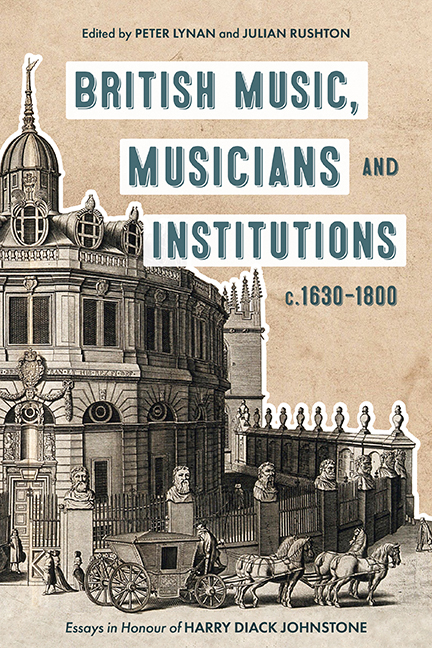Book contents
- Frontmatter
- Contents
- List of Illustrations
- List of Music Examples
- List of Contributors
- Acknowledgements
- List of Abbreviations
- Note to the Reader
- Introduction
- Part I Performers and Performance Style
- Part II Composers and Secular Institutions
- Part III Sacred Music and Institutions
- Part IV Dissemination: Copying, Printing, and Publishing
- Epilogue: Musica Britannica and the Eighteenth Century
- Harry Diack Johnstone: A Tribute
- Bibliography of the Publications of Harry Diack Johnstone
- Index
- Tabula Gratulatoria
9 - Music and Musicians at Westminster Abbey, 1685–1760
Published online by Cambridge University Press: 06 October 2022
- Frontmatter
- Contents
- List of Illustrations
- List of Music Examples
- List of Contributors
- Acknowledgements
- List of Abbreviations
- Note to the Reader
- Introduction
- Part I Performers and Performance Style
- Part II Composers and Secular Institutions
- Part III Sacred Music and Institutions
- Part IV Dissemination: Copying, Printing, and Publishing
- Epilogue: Musica Britannica and the Eighteenth Century
- Harry Diack Johnstone: A Tribute
- Bibliography of the Publications of Harry Diack Johnstone
- Index
- Tabula Gratulatoria
Summary
Writing in 1990, Harry Johnstone noted that the eighteenth century ‘has long been regarded as something of a “Dark Age” in English music’. A similar view could be said to have coloured perceptions of the cathedrals and collegiate churches of England in the same period. A glance at any history of an English cathedral published before the last decade or so of the twentieth century is likely to reveal that the chapter on the eighteenth century (if there is one at all) is by far the shortest. The Georgian church, we are to understand, was characterized by complacency, indolence, and pluralism, characteristics which, readers might easily conclude, were never to be found before or since in the history of the English church. Edward Pine, the author of The Westminster Abbey Singers, the first substantial musical history of Westminster Abbey, certainly shared this mistrust of the Georgian age. In opening his chapter on the period Pine did not hide his distaste:
The eighteenth century in many ways is a detestable century. In spite of Johnson and Horace Walpole – and anyone can name a pair of redeeming individuals to his own fancy to save Sodom – the veneer is thin. The wigs and the clothes are elegant, the punctilio engaging, but underneath are Prinny and Chesterfield, Hervey and Louis Quinze.
Warming to his theme, Pine continued: ‘In Ecclesiastical History the century does not bear thinking about. It was the age of mildew, of getting a maximum of money for a moment of time […].’ Despite this, and a somewhat discursive style, Pine presented a good deal of useful information about the abbey’s musicians during the period he professed to abhor. Unfortunately the book suffers from the absence of any references to sources, even though Pine clearly made extensive use of the abbey's own muniments.
When a multi-authored general history of Westminster Abbey was published in 1966, it fell to Sir William McKie, a former Organist and Master of the Choristers, to provide the chapter on music. This was one of a handful of subject-themed contributions in an otherwise chronological survey, and it remains a useful introduction (although almost exclusively concerned with the post-Reformation period). But it was certainly not the detailed history of the abbey's music which McKie had aspired to write in his retirement but never produced.
- Type
- Chapter
- Information
- British Music, Musicians and Institutions, c. 1630-1800Essays in Honour of Harry Diack Johnstone, pp. 167 - 182Publisher: Boydell & BrewerPrint publication year: 2022



